Revenue management is concerned with optimizing financial results and is especially popular in industries like hospitality, which must contend with high fixed costs and a perishable inventory. For example, hotels have a certain number of rooms and fixed costs, which must be met regardless of how many rooms are sold. In such industries, revenue management predicts demand and optimizes inventory and price availability. When utilized correctly, this will ultimately result in higher revenue.
Table of Contents:
- History of Revenue Management
- What is Revenue Management?
- Necessary Conditions for Revenue Management
- Revenue Management vs. Yield Management
- The Importance of Revenue Management
- All About Forecasting
- What is Forecasting?
- Why is Forecasting So Important?
- Useful Forecasting Tips
- Strategies for Revenue Management
- The Main KPIs for Revenue Management
- Revenue Management Pricing Strategies
- Further Revenue Management Tips
- Open Pricing Strategy for Your Hotel
- Global Hotel Industry Revenue Management Outlook 2025-2035
- Explore Hotel Revenue Management Courses
- How Can a Revenue Management System Help?
- Features of a Revenue Management System
- What is Total Revenue Management?
- The Latest Hotel Revenue Management Strategies, Tactics, Trends, and Tips
- The Latest Hotel Marketing Strategies, Tactics, Trends, and Tips
- Revenue Management in Other Industries
History of Revenue Management
The history of revenue management can be traced back to the 1980s, originating in the airline industry. In response to growing competition and deregulation, airlines started using dynamic pricing to improve financial performance. American Airlines was a pioneer. They successfully applied techniques like price discrimination and demand forecasting to manage their seat inventory more effectively.
Their work actually began in the 1960s, built on the idea that airline seats, like hotel rooms, are perishable, and not all customers should pay the same price. Under President Robert Crandall in the 1980s, American Airlines introduced “yield management,“ a strategy that adjusted prices based on booking timing and included overbooking practices. Crandall reported that this approach helped the airline earn an additional $500 million annually.
In 1985, American Airlines launched the first full-scale revenue management system. Within three years, it generated more than $1.4 billion in extra revenue. Inspired by this success, Marriott became the first hotel company to adopt similar methods.
Bill Marriott Jr., Chairman and CEO, Marriott International, noted,
“Revenue management has contributed millions to the bottom line, and it has educated our people to manage their business more effectively. When you focus on the bottom line, your company grows.”
This marked the start of revenue management’s expansion into hospitality and other industries.
What Is Revenue Management?
So, what is revenue management, and what does it entail? Broadly, it can be described as the use of analytics, which helps predict customer behavior so that product availability and price can be optimized to generate the maximum amount of revenue possible.
Within the hospitality industry, the chief purpose is to increase revenue while selling the same number of products or services, such as hotel rooms. It is essentially about matching supply and demand, and successful revenue management involves understanding how customers think and their perceptions of value.
This may mean refusing to sell a room today so that you can sell it for a higher price tomorrow, but it might also mean recognizing when demand is low enough that you should sell at a discounted price.
According to the latest Duetto Revenue Management Trends & Predictions Survey, hoteliers now rank revenue management 4.8 out of 5 in terms of importance to their business in 2024, up from 4.4 out of 5 in 2023.
The Most Common Definition of Revenue Management is:
Selling the right product to the right client at the right moment at the right price via the right distribution channel with the best cost efficiency
Video “What is revenue management?”
Necessary Conditions for Revenue Management
For a business to employ a revenue management strategy effectively, several conditions must be in place.
These conditions are as follows:
- Different customers must be willing to pay different prices for the same service or commodity;
- The business must have some ability to predict the changing levels of demand ahead of time.
- Only a fixed amount of resources is available to be sold at any given time.
- A perishable inventory, e.g., the resources, can no longer be sold after a certain point.
Revenue Management vs. Yield Management
Revenue management can be considered to be quite similar to yield management, and indeed, many business owners confuse the two concepts. Yield management came first and is more tactical than strategic. It also has a narrower focus, as yield management describes the price optimization part of the process. By contrast, revenue management considers the bigger picture more and may involve things like forecasting and in-depth analytics.
To provide an example concerning the hospitality sector, yield management would be concerned with the sale of a hotel room, whereas revenue management may take into account the full implications, including areas of secondary spending and the cost involved in actually selling the room in the first place.
Robert Crandall, former chairman and CEO of American Airlines, gave yield management its name and has called it,
“the single most important technical development in transportation management since we entered deregulation“.
However, the evolution to revenue management reflects the industry’s maturation toward comprehensive profit optimization. For more detailed information about the difference between revenue management and yield management, please also read the article “Revenue Management vs. Yield Management”.
The Importance of Revenue Management
As a strategy, revenue management allows businesses to adopt a data-driven approach to decisions on what to sell. It ensures that informed decisions are made and your business does its best to drive revenue upward while selling the same products and services as before.
Revenue management is often concerned with predicting demand and optimizing price and availability to boost revenue. An even more professional approach is also to take into account all spending revenue per area per room and all distribution and/ or operational costs. This will give hoteliers an even greater insight into the actual performance of their hotel.
According to STR Global, U.S. hotels saw a 1.8% increase in RevPAR in 2024, driven mainly by higher room rates, while CBRE’s 2025 Global Hotel Outlook predicts RevPAR will grow another 2% in 2025.
As noted by CBRE’s VP of Global Hotel Asset Management, Miri Vasilevsky-Pinto,
“A hotel’s success isn’t confined to room rates but extends to a variety of revenue sources. Technology and data lead us to maximum profitability by providing personalized experiences that captivate guests across every part of the journey.”
All About Forecasting
Forecasting can play a key role in revenue management strategies. Still, it is essential to know what forecasting is, why it is so beneficial, and some of the best ways to optimize its uses.
What Is Forecasting?
Forecasting refers to the practice of predicting future events based on an analysis of past and present data. Within the hotel industry, this means looking at past performance data, wider industry data, and information available to your business right now. From there, forecasting typically relies on identifying trends.
Once trends have been identified within the data, they can be taken into consideration, alongside other information, to make more informed predictions about what the future will bring. This may mean forecasting future revenue generation, room occupancy rates, customer behaviors, etc.
As Dr. Cindy Heo, Associate Professor of Revenue Management at EHL, explains,
“Demand forecasting plays a critical role in revenue management by providing data-driven insights into future customer behavior. Accurate forecasts allow hoteliers to set the right room rates, optimize inventory, and improve operational planning—all of which enhance revenue and guest satisfaction.”
Why Is Forecasting So Important?
Forecasting is a useful tool for revenue management because it allows those involved with hotel management to anticipate future events and plan for them. For example, you may be able to adjust your expenditure if your forecast suggests you will generate less revenue than the previous year.
Accurate forecasts can be invaluable because they allow hotels to prepare for bad news and mitigate damage while also capitalizing fully on high-demand periods. Although forecasting is never 100 percent accurate, it does mean key decisions can be taken based on trends and relevant information, eradicating some guesswork involved. An example is a Forecast Report by CBRE, which shows a 5.8% increase in RevPAR in 2023 because of inflation.
According to HSMAI (Hospitality Sales and Marketing Association International), 72% of hotel managers reported that inaccurate forecasts led to pricing issues and missed revenue opportunities. This underscores the need for robust forecasting systems that use both machine learning and human expertise.
Useful Forecasting Tips
Below, you will find a breakdown of some useful tips that can assist you with your forecasting efforts.
1. Maintain Accurate Records
Good forecasting relies on accurate data, so properly organizing and recording information is crucial. In particular, for hotel revenue management purposes, you will want to maintain spreadsheets with revenue, profit, occupancy rates, room rates, and other sales information. Ultimately, because forecasting depends on data, the quality of the records you keep can have a huge bearing on how precise your forecasts end up being.
2. Turn to Historical Data
One of the best tools at your disposal in terms of forecasting is historical data because many patterns that can influence revenue management are repetitive. While it cannot provide you with complete certainty, if your hotel experiences much higher demand in June, July, and August than at other times of the year, you can reasonably assume the same will occur again, and the same applies for periods of low demand too.
3. Examine Data Already in the Books
It is important to remember that the most reliable data available to you when attempting to make forecasts is the data in the books already. For hotels, this means room and restaurant bookings that have already been made and any planned events scheduled within the premises. Essentially, data in the books can be seen as “what you already know for sure,” and, at times, this information may contradict past hotel trends. STR’s forecasting study shows that properties using “business on the books” data alongside historical patterns achieve 15-20% better forecasting accuracy than those relying solely on historical trends.
4. Remember Holidays and Events
Various holidays and events can have a significant bearing on levels of demand, and this can, in turn, impact your revenue management strategy. For instance, if there are upcoming events close to your hotel, you may be able to forecast higher levels of demand than usual at that time of year. At the same time, holidays like Christmas will often lead to increased demand for hotel rooms, so these must also be considered. PwC’s 2025 Hospitality Directions report specifically mentions how “global events like the FIFA World Cup could boost tourism” in 2026. This report shows the measurable impact of major events on hotel demand forecasting.
5. Monitor Rival Hotels and Resorts
Another external factor to consider when forecasting for revenue management purposes is the behavior of your competitors. To do this, you will need to make sure you are aware of the various other hotels or accommodation options in the nearby area and hotels in other areas that appeal to your target audience. Have any new competitors emerged? Have existing ones made changes that may attract more visitors? Have any rival hotels closed?
According to THP data reported by EHL, with 8,011 hotel opening projects in the pipeline globally and 2,771 scheduled to debut in 2025, adding over 514,000 new rooms worldwide, competitive monitoring has never been more critical for accurate forecasting.
6. Additional Forecasting Tips
Furthermore, you need to consider wider industry and market trends, and you will have to follow up on your forecast with different departments so that strategies can be adjusted to maximize revenue generation. For instance, you may need to change the distribution channels you use or the regions you target.
STR research emphasizes the importance of macroeconomic variables, including economic predictors, such as Gross Domestic Product (GDP), inflation rates, and unemployment rates, which can boost forecast performance by capturing underlying causes of performance movements. Read the article “Forecasting Tips to Improve Your Revenue Management Strategy” for more forecasting tips.
Strategies for Revenue Management
Below, you will be able to learn more about some of the different strategies you can adopt for revenue management purposes, allowing you to optimize your hotel’s financial results.
Get to Grips With Your Industry and the Market
Getting to know the market you are in and fully understanding your industry are prerequisites for successful revenue management. You must be aware of your competitors, not only in the hotel industry but also in other areas where your business could potentially be impacted. You also need to understand hotel technology trends and other trends impacting your industry, along with your ability to appeal to customers.
Segmentation and Price Optimization
Another useful revenue management strategy involves segmenting your customers into different types. Once you have done this, you can start to think about how each type of customer behaves, when they book, how they book, and so on. The benefit here is that you can approach different customer types with different pricing strategies and marketing strategies rather than trying to appeal to everyone with a single, uniform approach.
Nooshi Akhavan, Director of Revenue Performance & Distribution at Coast Hotels, notes the transformation:
“Twenty years ago, there were just four segments: transient guest (business and leisure weren’t divided then), group guest, tour and wholesale, and crew. Today, I’ve seen hotel brands that have 18 market segments.”
A study published in the International Journal of Hospitality Management shows that room rates alone explain 64.6% of occupancy variability; demand spikes tied to segmentable events (e.g., conferences) can be capitalized through segment-specific pricing. IHG, for example, segments by purpose, business, leisure, crew, and customizes packages and messaging accordingly.
Aim for Cross-Departmental Alignment
Hotels and similar businesses succeed when the various departments pull in the same direction to achieve common goals, which is also relevant to revenue management. Your overall approach here needs to be based on evidence and data, and you can use this to bring individual departments on board. From there, it is important that all departments work together to create consistent messaging and experiences for customers.
A Deloitte European Hotel Industry survey found that for most hotel industry executives, managing cash flow and improving performance are expected to be top priorities in 2025. This survey highlights that revenue management can no longer operate in isolation; it requires integration with sales, marketing, operations, and guest services.
Choose the Best Pricing Strategy for the Moment
When it comes to pricing strategies, selecting the right strategy for the moment you are in is important. There may, for example, be points in time when demand is low, and the priority is simply to fill a room in your hotel. At such a moment, offering discount pricing makes sense. However, there may be other points where demand is high, and you adopt a value-added approach, or you may base your pricing on your competitors’ rates.
According to a study published in PMC, hotels using economic pricing strategies that position themselves competitively in the market saw significant benefits. The study found that a 5% increase in customer retention can lead to a profit increase of between 20% and 90%. This shows that the right competitive pricing approach not only attracts guests but also keeps them coming back.
Make Direct Bookings a Top Priority
A key part of revenue management is using the right distribution channel to find the right customer. While you want to reach as many people as possible, the priority should be generating direct bookings when possible. When bookings are made directly, you do not need to pay commission fees or other fees to anyone else, maximizing revenue. According to the Global Hotel and Other Travel Accommodation Market Report by Research and Markets, direct bookings account for 27% of hotel bookings. Special offers, loyalty programs, and a high-quality booking process are all ways to offer incentives for direct bookings.
According to Skift Research’s Hotel Distribution Outlook, direct channels could potentially generate more than $400 billion of hotel gross bookings versus $333 billion from OTAs by 2030. This shift toward direct bookings represents a significant opportunity for hoteliers to reduce commission costs and increase profitability.
Ancillary Revenue Strategy
An ancillary revenue strategy involves maximizing the amount of revenue generated through additional products or services offered by your hotel business aside from simply selling hotel rooms. Examples are numerous and include spa and leisure services, conference and events services, tours, food and beverage services, a hotel gift shop, and more. CBRE data shows U.S. hotel spas grew spa revenue per available room (PAR) by 12.6% from 2018 to 2022, with resort spas rising 14.2%.
From a revenue management perspective, an ancillary revenue strategy is beneficial because it allows revenue and profit generation to be optimized throughout the entire business. Many additional income sources are also not subject to “lost” income associated with guests booking their rooms through third-party platforms, resulting in commission fees.
Table: Components, Benefits, and Examples of Ancillary Revenue Management Strategy
| Component | Benefits for Hotels | Examples |
|---|---|---|
| Bundling | Increases overall revenue by offering packages of services at a bundled price. Enhances the customer experience with added value. Encourages longer stays and additional spending on-site. |
A hotel offering a “Romance Package” includes a room, champagne, and a couples’ spa treatment at a discounted rate. A family-oriented hotel offering a “Family Fun Package” including accommodations, theme park tickets, and breakfast. A resort bundling room reservations with golf packages or spa services. |
| Customer Segmentation | Allows hotels to tailor offers to different customer segments based on preferences and behavior. Maximizes revenue by optimizing pricing and packages for each segment. |
A luxury hotel segments customers and offers loyal guests exclusive perks, such as room upgrades and personalized services. A business hotel offering corporate travelers customized packages with amenities like free Wi-Fi and airport transfers. A boutique hotel targeting honeymooners with special packages, such as romantic dinners and spa treatments. |
| Distribution Channels | Broadens the reach of ancillary offerings by utilizing various distribution channels. Enables efficient promotion and sale of ancillary services across different platforms. |
A hotel partnering with online travel agencies (OTAs) to promote package deals to a global audience. A resort using its official website, social media platforms, and travel agents to distribute exclusive packages. A boutique hotel leveraging metasearch engines and mobile apps to showcase its unique experiences. |
Additional Revenue Management Strategies
Several other revenue management strategies are worth keeping in mind. Examples of this include everything from embracing digital marketing strategies like search engine optimization and mobile optimization to reach more people right the way through to enlisting the help of a freelance revenue manager so that you can optimize your strategy. Read “Revenue Management Strategies to Grow Your Hotel Business” to find out more.
The Main KPIs for Revenue Management
Ultimately, revenue management is about improving financial results. However, you must understand how your hotel performs to do this. Below are some of the most essential key performance indicators (KPIs) to monitor.
Occupancy Rate
A hotel’s occupancy rate describes the number of occupied rooms at a particular period in comparison to the number of rooms that can be occupied. Essentially, the point of this key performance indicator is to identify how many available rooms have been filled, which is expressed as a percentage.
Formula: Occupancy Rate (%) = Number of Occupied Rooms / Total Number of Available Rooms
According to STR’s latest data for May 2024, U.S. hotels achieved an occupancy rate of 65.7% (+1.5% year-over-year), demonstrating continued recovery momentum. Current forecasts indicate that occupancy rates for 2024 are expected to hit 63.6%, which is only 3.4% short of 2019 pre-pandemic levels, according to AHLA projections.
Looking ahead, PwC forecasts a mild dip in demand at the start of 2025, but expects a strong rebound throughout the year, pushing average occupancy to around 62.9%. Industry experts generally agree that higher occupancy is good, as it means more rooms are generating revenue. However, they caution against using aggressive discounting to boost occupancy, as it can hurt profitability.
Average Daily Rate (ADR)
The average daily rate KPI tells a hotel the average amount it makes in rental income per occupied room. It only considers rooms that are occupied through paid bookings, so it will not include empty rooms or rooms occupied by staff. It is a crucial metric for understanding how much money you are making, on average, from each room you sell.
Formula: ADR = Room Revenue Earned / Total Number of Rooms Sold
RevPAR
RevPAR is one of the most widely used KPIs for hotel revenue management purposes, and it stands for revenue per available room. This metric tells you the amount of revenue that is being generated per room, irrespective of whether those rooms are occupied. It is, therefore, a measure of your property’s overall revenue performance. Oxford Economics analysis for AHLA found that the U.S. hotel industry “achieved a 4.8% year-over-year increase in RevPAR in 2024,” which exceeded the 2023 projection by 1.5%.”
Formula: RevPAR = Room Revenue Earned / Total Number of Available Rooms
RevPOR
Revenue per occupied room, or RevPOR, shares similarities with the average daily rate metric because it is also concerned with revenue generated from occupied rooms. However, while ADR is concerned with room rental income, RevPOR takes a wider view, factoring in things like breakfast, room service, spa services, etc.
Formula: RevPOR = Total Revenue from Occupied Rooms / Number of Rooms Sold
GOPPAR
The GOPPAR metric stands for gross operating profit per available room. By tracking and examining this, you can understand the real financial performance of your hotel because it is focused on profit rather than revenue. This factor in expenditure is based on the available rooms rather than the rooms sold.
Formula: GOPPAR = (Total Revenue – Total Expenditure) / Total Number of Available Rooms
All Revenue Management KPIs
It is best to track as many key performance indicators as possible to get the most from your revenue management efforts, as this will equip you with more information to use when making strategic decisions. Crucially, each KPI will tell you something slightly different, giving you a holistic view, and certain problems may be easier to spot using one KPI than another. Check out “The Most Used Revenue Management KPI’s for Hotels” to learn more.
Chris Legaspi, Chief Commercial Officer, Archipelago International, via HSMAI Asia Pacific, says,
“Let’s stop obsessing over RevPAR. It’s time to manage to profit… We don’t run our business on occupancy and rate alone anymore. We run it on what stays in the bank.”
Revenue Management Pricing Strategies
Here, you will find a breakdown of some of the main pricing strategies that may be adopted for revenue management purposes. Each strategy has its unique benefits, but some strategies are best deployed at specific times.
Forecast-Based Pricing
Pricing based on forecasting allows hotels to adjust their rates seamlessly, in line with anticipated demand. For example, when demand is expected to be high, the hotel can charge higher room rates, whereas during times of low demand, the hotel can potentially fill rooms that would otherwise be left unoccupied by offering discounted rates. This strategy does, however, rely heavily on a high-quality forecasting strategy. Recent research shows that advanced AI models can achieve “at least 15.8% and at most 53.1% improvements” in forecasting accuracy metrics.
Rate Parity
The basic principle behind rate parity is consistent pricing across all available distribution channels. It is a requirement to list your hotel on certain online travel agency websites, and it can help to generate trust from customers because they will know they are all paying the same price for the same rooms. However, it does make it harder for hotels to use pricing to attract direct bookings, and this might mean paying more commission to third parties.
Price Per Segment
Price per segment is another common strategy for revenue management purposes and involves selling the same rooms at different prices to different customer segments. For example, this might mean selling rooms at a lower rate to business customers because they are likely to use corporate facilities. It may also involve selling rooms at a lower rate to travel agents, who will then sell them on to customers as part of package deals.
A study published in the International Journal of Hospitality Management shows that room rates alone explain 64.6% of occupancy variability; demand spikes tied to segmentable events (e.g., conferences) can be capitalized through segment-specific pricing. IHG, for example, segments by purpose, business, leisure, crew, and customizes packages and messaging accordingly.
Discount Codes for Direct Bookings
Direct bookings should always be prioritized because they allow you to take all of the money the customer spends rather than paying a commission. One of the strategies hotels adopt to encourage this is to offer discount codes. These can be offered in advance to attract bookings during times of low demand, but they can also be offered upon checkout to encourage return customers and persuade customers to book directly next time.
IHG Hotels & Resorts offers one of the most compelling examples through its Best Rate Guarantee. If a guest finds a lower price on a third-party site, IHG will match it and award up to 40,000 IHG One Rewards points. These points can be worth over $200, especially when redeemed at high-end properties. Additionally, IHG’s “Your Rate” program provides member-only discounts when booking directly.
According to Skift, after IHG launched “Your Rate” at over 4,500 hotels, direct bookings increased by 2%, while OTA bookings decreased by the same amount. This indicates that offering better deals to direct bookers enables hotels to save on commissions and build stronger customer relationships.
Package Room Deals
Package deals allow you to offer discounts on multiple room sales, making them extremely effective for attracting group bookings. This can help your revenue management efforts, especially when you want to fill as many rooms as possible. Although you will be selling the rooms for slightly less than they would sell individually, the guarantee of multiple rooms being sold is often worth it, especially when demand is low. According to Expedia Group, properties that offer travel packages typically see a gross booking value increase of over 5%, rising to more than 10% at hotels with 25 or more rooms or those outside the U.S.
More Pricing Strategies
Aside from those mentioned, several other pricing strategies can be useful when optimizing revenue. These include a length of stay strategy, where you may be able to encourage guests to extend their stay by offering a discount, as well as up-selling and cross-selling. To learn more about these strategies and how they work in practice, look at the “Pricing Strategies to Increase Your Hotel Revenue” article.
Further Revenue Management Tips
Below are some extra tips that will help you with your revenue management strategy.
Build a Culture of Revenue Management
One of the best ways to enhance your revenue management is to create a culture where revenue management matters to everyone. This means creating awareness within your hotel of revenue management, its purpose, and why it is so important to your hotel. When you create this kind of culture, you boost the chances of individual departments and employees utilizing best practices for recording data and making evidence-based decisions.
Keep Pace With Changes in Customer Behavior
While past data is important in revenue management, you cannot neglect what is happening today and tomorrow. This is especially true regarding changes in customer behaviors and habits. For instance, you may notice that, compared with five or ten years ago, more of your customers are booking online rather than through travel agents. Keep a close eye on changing habits and ensure your strategies are relevant for modern customers.
According to Grand View Research, the global online travel market was valued at $612.95 billion in 2024 and is projected to reach $1.3 trillion by 2030, growing at an annual rate of 13.1%. Research shows that “82% will end up making their booking online” with “over 90% of travelers doing their research online.”
Emphasize Value Rather Than Price
It is not always possible to generate greater demand by lowering the price, and it may not always be advisable to do so anyway. An alternative is to emphasize value rather than price. After all, people are willing to pay more if guaranteed better service and a better overall experience. You can also provide extras, such as discounts on additional nights, free breakfasts, or other services, while keeping your prices where you want them.
Industry research strongly supports the value-over-price approach. HFTP analysis reveals that 70% of guests are expected to prefer personalized offers by 2024, with revenue from hotel ancillary services projected to grow by 10% annually. This demonstrates that value-added services generate significant revenue beyond base room rates. Sustainability adds another value dimension, with “70% of travelers in 2024 preferring sustainable holidays and travel options,” though 83% confirm sustainable travel is important despite implementation challenges.
Only Use Automation in the Right Places
Automation has a major role in revenue management, but it is important not to become overly reliant on it. While software can make calculations instantly and algorithms can be set up to inform decisions, the best strategies require nuanced thinking. Sometimes, you need to think outside the box, take chances, or try something new; a human touch will be required.
Industry data shows balanced perspectives on automation adoption. Duetto’s survey reveals that “83.9% are currently using a revenue management system (RMS), up from 82.3% in 2023,” with “automated pricing recommendations topping the list of important features” for RMS users.
HFTP studies show that “artificial Intelligence (AI) in the hotel industry is projected to grow by 40% in 2024,” with “75% of hotels expected to use AI for personalized pricing” and “hotels that use AI for customer service seeing a 25% increase in direct bookings.”
More Revenue Management Tips
There are several additional revenue management tips to keep in mind, from mapping out where demand comes from to making sure your website and booking engines are all fully mobile-optimized. You can read more about these tips and understand why they are important by reading “Revenue Management Tips for Hotels”.

Heiko Rieder, Vice President Business Development, Hirmer Hospitality and Travel Charme Hotels“If hotel owners or members of the management board do not listen to revenue managers (RMs) during budget preparations for the upcoming year, it is highly likely that unrealistic revenue targets as well as marketing costs will be set. In that case, it is important to manage stakeholders’ expectations and be very transparent with the risk assessment. To prevent this from happening Revenue Managers should present budget recommendations with a data-driven approach and show concrete evidence or case studies consisting of historical data, competitive pricing, scenario planning and market trends. In order to gain owner buy-in it is also important to educate and encourage them in an open dialogue about the ongoing revenue performance and latest trends. An aligned set of KPIs will simplify the monitoring of the agreed strategy.” Click here to learn the risks off ignoring revenue management from our Expert Panel. |
Open Pricing Strategy for Your Hotel
An open pricing strategy moves away from the fixed modifiers associated with the BAR (best available rate) model that many hotels rely on, providing hotels with greater flexibility to change the rate they are charging for a room based on the level of demand at the time, to maximize revenue.
This model also provides potential benefits for the customer because it means the hotel has greater flexibility to price rooms away from the established BAR, which can sometimes result in a better rate for hotel guests, especially in times when it suits a hotel’s revenue management strategy to fill a room quickly.
Open pricing means many different incremental price points to be plotted against a demand curve. Pricing can be moved away from BAR when the situation requires it or when it is beneficial. This wider range of price points makes it easier to attract customers, meaning more rooms are filled, and more revenue comes in.
Using a more fixed approach to pricing, hotels are sometimes required to close off potential distribution channels or limit sales on particular days, even if customers plan to stay longer. Open pricing provides freedom and avoids closing off distribution channels or promotional opportunities. You can learn more about this approach and its benefits by reading “Open Pricing: Why Is It the Next Hotel Revenue Management Strategy?”
Global Hotel Industry Revenue Management Outlook 2025-2035
The hotel industry is entering a new era, shaped by smart technology and growing demand for eco-friendly travel. Over the next 10 years, revenue management will change dramatically, driven by artificial intelligence, sustainability, and rising guest expectations.
The global hotel market, worth $785 billion in 2023, is expected to grow to $1.13 trillion by 2030. At the same time, the hotel revenue management system market is set to double, growing from $16.4 billion in 2023 to $29.4 billion by 2031. Hotels are investing heavily, over $1 billion annually, in technology that utilizes AI to determine room prices based on demand, competition, and real-time data. McKinsey reports that hotels using AI see ~17% revenue growth and 10% higher occupancy versus non-adopters.
This new generation of revenue tools does more than adjust room rates. They help hotels price and manage everything, from spa services to event spaces, based on real-time trends. At the same time, travelers are looking for greener hotels. Up to 78% of guests prefer eco-friendly stays, and many are willing to pay more. Hotels with strong sustainability practices can now charge higher prices and even get better financing.
By 2035, automated pricing and predictive analytics will guide most decisions. Hotels that embrace technology and care about the planet will lead the market.
Explore Hotel Revenue Management Courses
If you are a hotel owner, general manager, or otherwise involved in key strategic decisions around revenue management, it may be beneficial to take a closer look at formal hotel revenue management courses. These will cover everything from the basics of revenue management to the specific strategies and the best tools.
Read “Hotel Revenue Management Courses: Information + List of Educators” for more information on how these courses can benefit you and for a list of some of the organizations that offer these courses.
How Can a Revenue Management System Help?
A revenue management system, or RMS, is a software solution that allows you to perform various revenue management-related tasks more easily. The software can use data you input, as well as wider industry data, and perform real-time analysis of the state of your business and your current financial performance.
Using a revenue management system can help improve efficiency and accuracy while offering useful insights. To learn more, read “Revenue Management System (RMS): What Are the Advantages?”
Features of a Revenue Management System
Before investing in a revenue management system, it is a good idea to familiarize yourself with the available features. These can vary from one solution to the next but typically include things like pricing systems, integration with other hotel software, data visualization, forecast management options, and much more.
Read “RMS System: An Overview of the Most Important Features” for a more in-depth breakdown of the main features, complete with an explanation of how they work and why they may be useful to you.
What is Total Revenue Management?
To maximize profitability, hotels need to optimize the performance of multiple revenue sources, including food and beverages, conferencing facilities, leisure activities, and more. This is the basic idea behind total revenue management: applying revenue management techniques to all applicable departments.
Check out “Total Revenue Management: How Hotels Can Maximise Their Revenue“ to learn much more about total revenue management as a concept, how it differs from more standard hotel revenue management, the advantages of using total revenue management, and some tips on implementing such a strategy in your hotel.
The Latest Hotel Revenue Management Strategies, Tactics, Trends, and Tips
Revenue management involves selling the right room to the right guests at the right price through the right channels to maximize your financial results. In the category “Revenue Management”, you will be able to learn more about some of the specific revenue management strategies and tactics that can assist with this, as well as key trends. You will also find specific tips to help you improve your revenue management efforts.
The Latest Hotel Marketing Strategies, Tactics, Trends, and Tips
Hotel marketing encompasses various strategies and tactics, and it is important to familiarise yourself with these. In the category “Hotel Marketing”, you will find blog posts that offer all of the most critical information and details on some of the key trends within the hotel industry. Beyond this, you can access tips that can help you improve your hotel marketing and get the most out of your financial investment in this area.
Revenue Management in Other Industries
It all began in the airline industry and is primarily associated with hotels, but it can be employed in almost any business where changes in levels of demand can be predicted, where fixed costs must be paid regardless of sales, and where customers are willing to pay different prices for the same product or service. In addition to its use within the hospitality industry, revenue management has emerged as a popular strategy within car rental companies, theatres, financial services, medical services, and telecommunications.
Revenue Management FAQs
Want to Learn More About Management in Related Industries?
All hospitality, travel, and tourism-related industries have commonalities. However, management in each industry is influenced by specific, unique factors. You can learn more about management within related industries in the following articles.
- Hotel Management: Everything You Need to Know About Managing a Hotel
- Hospitality Management: The Essentials About Hospitality
- Tourism Management: All You Need to Know About Tourism
- Restaurant Management: Everything You Need to Know
- What is Travel Management?
- Aviation Management: A Great Guide to Start Your Career in Aviation
- Destination Management: How Tourism Adds Value to Your Destination
More Tips to Grow Your Business
Revfine.com is the leading knowledge platform for the hospitality and travel industry. Professionals use our insights, strategies, and actionable tips to get inspired, optimize revenue, innovate processes, and improve customer experience.Explore expert advice on management, marketing, revenue management, operations, software, and technology in our dedicated Hotel, Hospitality, and Travel & Tourism categories.


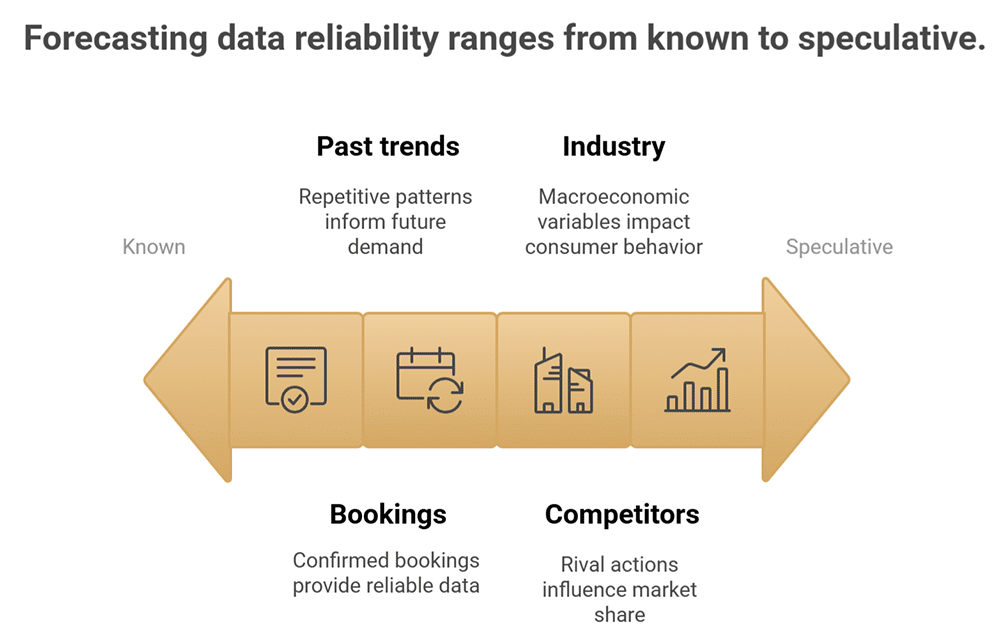

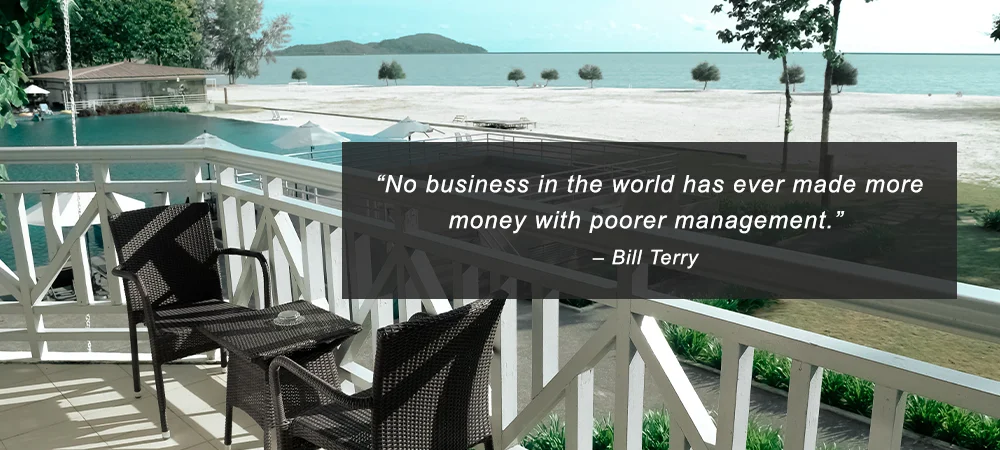
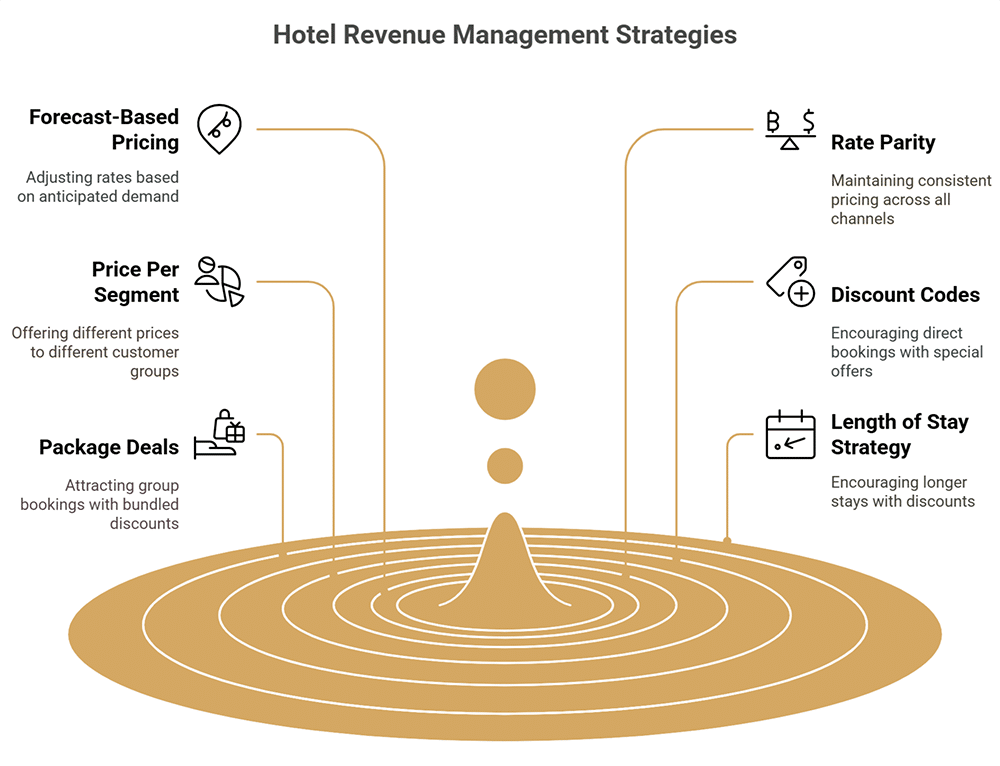




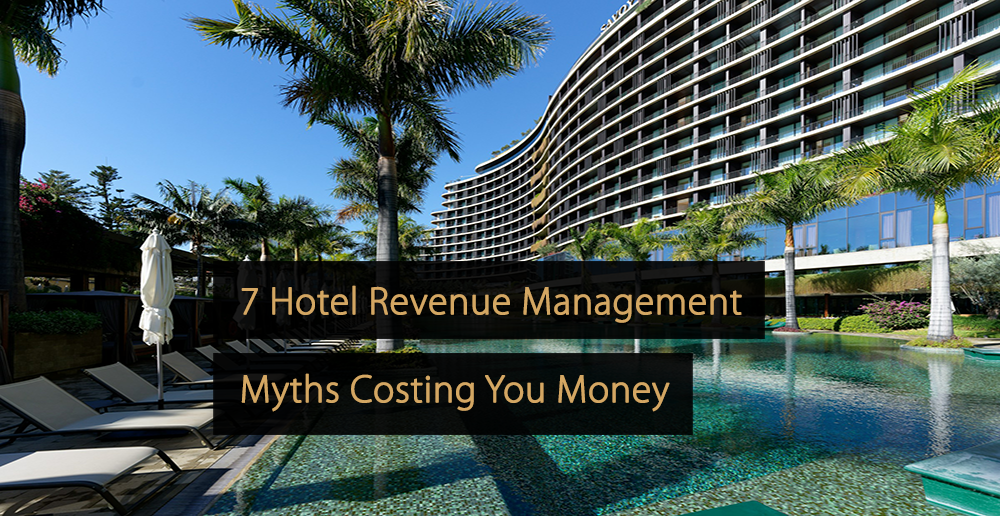
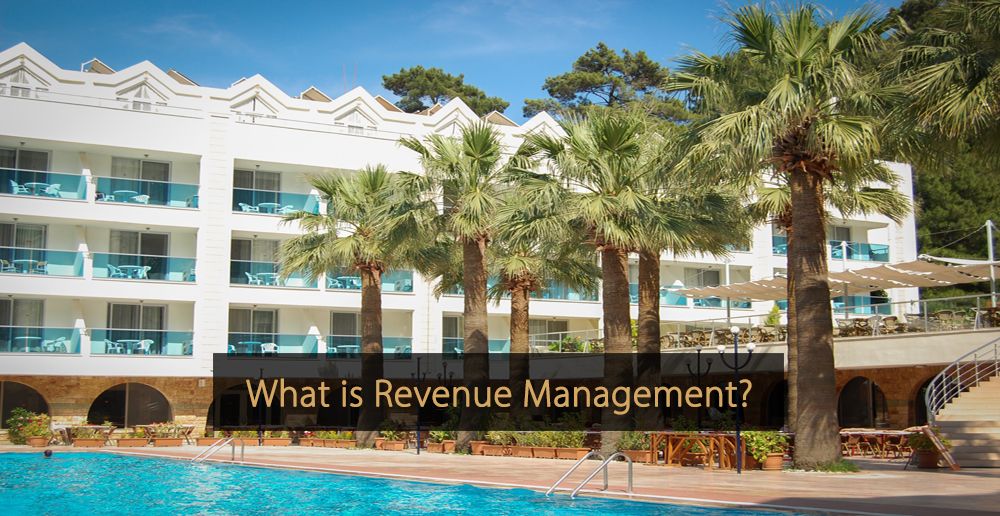
Very good revenue management information and tips. It helps me to refresh my knowledge within my revenue management career.